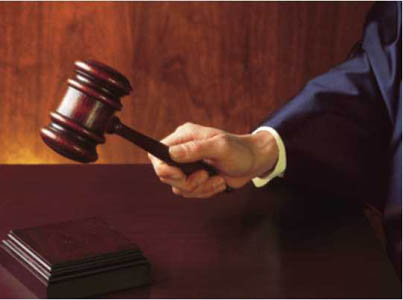
Apparently juror boredom is becoming a problem. According to an article in this month's APA Monitor on Psychology, "Every day in U.S. courts, jurors fall asleep, become frustrated by trial delays, seek out Google or Facebook on their cell phones, or daydream when they should be paying attention to trial testimony." Such incidents have resulted in mistrials and overturned convictions (even in one murder case!) when attorneys provided evidence that one or more jurors failed to pay attention during court proceedings. This is not just a U.S. problem: one juror in a murder trial in the U.K. was charged with contempt when she allegedly hid an MP3 player under her headscarf.
Ryan J. Winter, Ph.D., MLS, and Jon Carbone, MA, authors of the Monitor article, suggest that tech-savvy jurors, who may be accustomed to the constant stimulation of cell phones, text messages, tweeting and web-browsing, may drift off when forced to sit still without their gadgets and listen to hours of testimony. They point out the case of one Oregon juror who was cited with contempt when he fled the courthouse offering extreme boredom as his motive for leaving against the judge's orders.
Jurors, it seems, are like small children in a classroom. We can't expect them to sit too long and just absorb information. We need to engage them by making the courtroom experience interactive. I am all for finding appropriate ways for jurors to interact with the court system if it allows them to obtain information that will help them come to a just verdict. For example, in Oregon and Arizona, jurors (at the judge's discretion) can write down questions for witnesses and pass them to the judge. Oregon believes that this practice has kept jurors more engaged in trials. And the quest is on to seek other creative ways of allowing jurors to interact in the courtroom.
But I admit to being rather dismayed that we cannot, as a citizenry, be counted upon to pay attention to events where we ourselves will issue verdicts that will affect the life of one or more of our fellow citizens for years to come, and possibly for life. Since when did we lose the ability to sit still and pay attention to matters of importance? Are we so addicted to the constant stimulation of our tech gadgets that our minds wander or we doze off when deprived of that stimulation?
A few weeks ago, I posted a suggestion that we all "unplug" from our tech devices at regular intervals for the purpose of allowing our brains the opportunity to muse and reflect without the constant drain on our attention that social networking and web-browsing induces. Now, we have another reason to unplug with regularity: to make sure that we don't lose the ability to fully engage in the moment and in our surroundings without the tugging need to sneak a peek at our Blackberries or iPhones.
Finding out who is tweeting or texting or leaving a message on our Facebook wall is not the essence of living; but I'm worried that a growing number of us are addicted to the virtual world at the expense of the "real" world. Searching for creative ways to engage jurors may be enabling a problem that could be better addressed by raising societal expectations that each of us will work to develop attention skills that will allow us to remain present during vital real-world events.
Today's creative tip:
Engage in the present. Take five minutes a day to just nonjudgmentally experience your environment. Try to clear your mind of thoughts, and then focus on each of your senses individually. What are you seeing? Look at colors, shadows and angles made by the objects around you. What are you hearing? Listen for subtle sounds, such as your breathing, rain on the roof or traffic in the distance, as well as obvious sounds in the foreground. What do you feel: fluctuations in temperature, the feel of your body against a chair, the floor beneath your feet, or fabric against your skin? Savor -- without judging -- the present experience!
References:
Byers, D. (July 9, 2007). Juror faces jail for listening to MP3 player under hijab.
Times Online. http://www.timesonline.co.uk/tol/news/uk/crime/article2049678.ece.
Specht, S. (August 15, 2010). "Do the jurors have any questions?" Mail Tribune. http://www.mailtribune.com/apps/pbcs.dll/article?AID=/20100815/NEWS/8150326.
Winter, R.J., & Carbone, J. (September, 2010). Would somebody please wake up juror number five?" Monitor on Psychology, 41(8), 26.